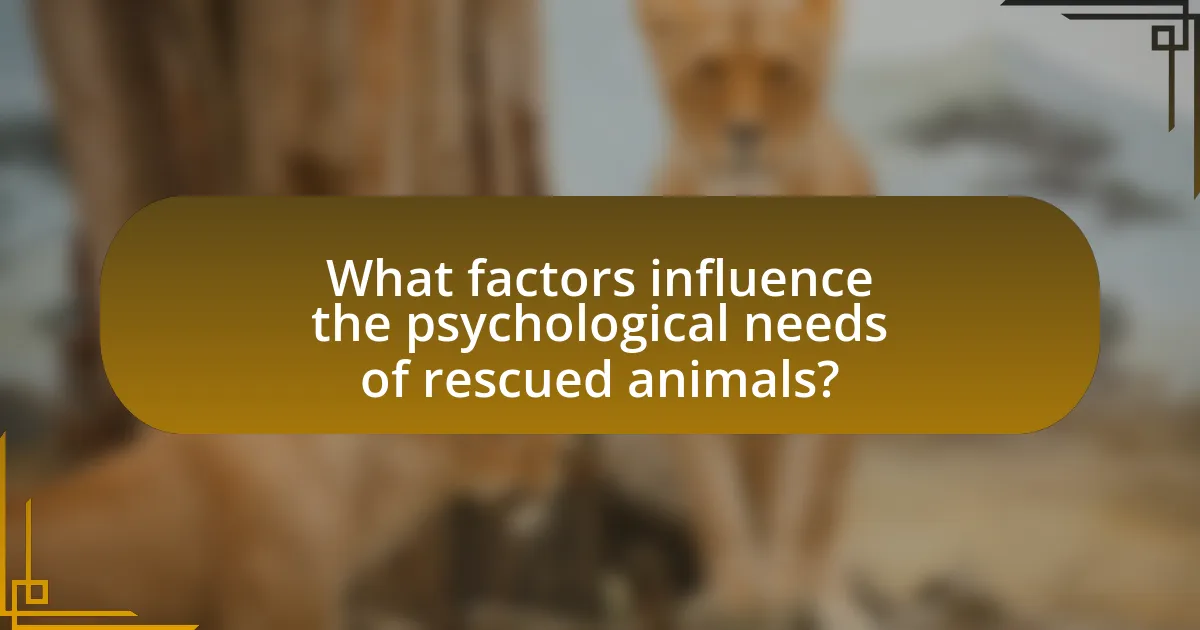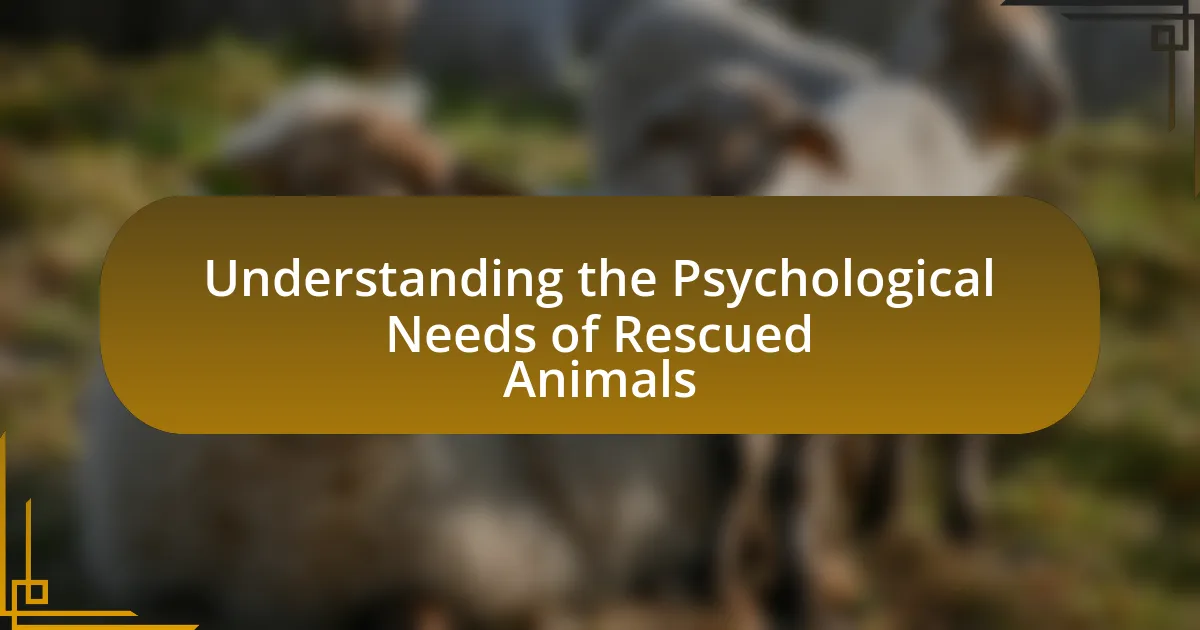The article focuses on understanding the psychological needs of rescued animals, emphasizing the importance of safety, social interaction, mental stimulation, and trust-building for their emotional well-being. It discusses how trauma and past experiences can lead to anxiety, depression, and behavioral issues, highlighting the significance of addressing these psychological needs for successful rehabilitation. Key factors influencing these needs include previous experiences, socialization, and environmental conditions, while effective strategies for caregivers include providing a stable environment, engaging in socialization, and implementing enrichment activities. The article underscores the role of mental health in the rehabilitation process and offers practical tips for caregivers to enhance the psychological well-being of rescued animals.

What are the Psychological Needs of Rescued Animals?
The psychological needs of rescued animals include safety, social interaction, mental stimulation, and trust-building. Rescued animals often experience trauma and anxiety from their past, necessitating a secure environment where they feel safe. Social interaction with humans and other animals is crucial for their emotional well-being, as it helps reduce feelings of isolation and fear. Mental stimulation through play and enrichment activities is essential to prevent boredom and promote cognitive health. Additionally, trust-building is vital; rescued animals need time and positive experiences to develop trust in their caregivers, which can significantly improve their overall mental health and behavior.
Why is understanding these needs important for animal welfare?
Understanding the psychological needs of rescued animals is crucial for animal welfare because it directly influences their mental health and overall well-being. When these needs are recognized and addressed, animals experience reduced stress, improved behavior, and enhanced quality of life. Research indicates that animals deprived of psychological enrichment can exhibit signs of distress, such as aggression or withdrawal, which can lead to further behavioral issues and hinder their chances of successful rehabilitation. For instance, a study published in the Journal of Applied Animal Welfare Science highlights that providing environmental enrichment significantly improves the welfare of shelter animals, demonstrating the importance of understanding their psychological needs.
How do psychological needs impact the behavior of rescued animals?
Psychological needs significantly impact the behavior of rescued animals by influencing their emotional well-being and social interactions. When these animals experience unmet psychological needs, such as safety, socialization, and mental stimulation, they may exhibit stress-related behaviors, including aggression, withdrawal, or anxiety. Research indicates that animals deprived of social interaction can develop behavioral issues; for instance, a study published in the Journal of Veterinary Behavior found that dogs lacking socialization opportunities often display fear and aggression towards unfamiliar people and animals. Thus, addressing the psychological needs of rescued animals is crucial for their rehabilitation and successful integration into new environments.
What role does mental health play in the rehabilitation of rescued animals?
Mental health is crucial in the rehabilitation of rescued animals as it directly influences their ability to adapt and thrive in a new environment. Animals that have experienced trauma or neglect often exhibit behavioral issues stemming from anxiety, fear, or depression, which can hinder their recovery and integration into a safe setting. Research indicates that addressing these mental health needs through behavioral therapy, socialization, and enrichment activities can significantly improve their emotional well-being and overall quality of life. For instance, a study published in the Journal of Veterinary Behavior found that animals receiving mental health interventions showed a 60% improvement in behavioral issues compared to those that did not receive such support. This evidence underscores the importance of prioritizing mental health in the rehabilitation process to ensure successful outcomes for rescued animals.
What are the common psychological issues faced by rescued animals?
Rescued animals commonly face psychological issues such as anxiety, depression, and behavioral problems. These issues often stem from past trauma, neglect, or abuse, leading to fear-based responses and difficulty in socialization. Research indicates that many rescued animals exhibit signs of post-traumatic stress disorder (PTSD), which can manifest as hyper-vigilance, aggression, or withdrawal. A study published in the Journal of Veterinary Behavior highlights that approximately 30% of rescued dogs show signs of anxiety-related disorders, emphasizing the prevalence of these psychological challenges. Addressing these issues through proper rehabilitation and training is essential for improving the well-being of rescued animals.
How does trauma affect the mental state of rescued animals?
Trauma significantly impacts the mental state of rescued animals, often leading to anxiety, depression, and behavioral issues. Rescued animals may exhibit signs of fear, aggression, or withdrawal due to past traumatic experiences, which can hinder their ability to trust humans and adapt to new environments. Research indicates that animals exposed to neglect or abuse may develop post-traumatic stress disorder (PTSD), similar to humans, resulting in heightened stress responses and difficulty in social interactions. For instance, a study published in the Journal of Veterinary Behavior found that shelter dogs with a history of trauma displayed increased levels of cortisol, a stress hormone, indicating chronic stress. This evidence underscores the importance of understanding and addressing the psychological needs of rescued animals to facilitate their recovery and integration into loving homes.
What signs indicate psychological distress in rescued animals?
Signs indicating psychological distress in rescued animals include changes in behavior such as excessive barking, hiding, aggression, or withdrawal. These behaviors often stem from trauma or neglect experienced prior to rescue. Research shows that animals may also exhibit signs like loss of appetite, destructive behavior, or repetitive movements, which are indicative of stress and anxiety. For instance, a study published in the Journal of Veterinary Behavior highlights that rescued dogs frequently display fear-based behaviors, reflecting their psychological state.
How can caregivers address the psychological needs of rescued animals?
Caregivers can address the psychological needs of rescued animals by providing a safe and nurturing environment that promotes trust and security. Establishing routines, offering positive reinforcement, and engaging in gentle socialization help animals acclimate to their new surroundings. Research indicates that animals exposed to consistent care and social interaction exhibit reduced stress and improved behavioral outcomes, as noted in studies by the ASPCA, which highlight the importance of stability in the rehabilitation process. Additionally, caregivers should be attentive to individual behavioral cues, allowing for tailored approaches that meet the specific emotional needs of each animal.
What techniques can be used to build trust with rescued animals?
To build trust with rescued animals, techniques such as gradual desensitization, positive reinforcement, and consistent routines are effective. Gradual desensitization involves slowly exposing the animal to new experiences and environments, allowing them to acclimate without overwhelming stress. Positive reinforcement, which includes rewarding desired behaviors with treats or praise, encourages the animal to associate humans with positive experiences. Consistent routines provide a sense of security, as animals thrive on predictability, helping them feel safe in their new environment. Research indicates that these methods significantly improve the bond between humans and rescued animals, fostering trust and reducing anxiety.
How can enrichment activities improve the mental well-being of rescued animals?
Enrichment activities significantly enhance the mental well-being of rescued animals by providing stimulation that mimics their natural behaviors. These activities, such as puzzle feeders, toys, and social interactions, reduce stress and anxiety, which are common in animals that have experienced trauma or neglect. Research indicates that animals engaged in enrichment show improved behavioral health, including reduced signs of depression and increased exploration and playfulness. For instance, a study published in the Journal of Applied Animal Welfare Science found that dogs exposed to environmental enrichment exhibited lower cortisol levels, indicating reduced stress. Thus, implementing enrichment activities is crucial for fostering a healthier psychological state in rescued animals.

What factors influence the psychological needs of rescued animals?
The psychological needs of rescued animals are influenced by factors such as their previous experiences, socialization, environment, and species-specific behaviors. Previous experiences, including trauma or neglect, can lead to anxiety and fear, affecting their ability to trust humans and adapt to new surroundings. Socialization plays a crucial role; animals that have had limited interaction with humans or other animals may struggle with behavioral issues. The environment, including the presence of safe spaces and enrichment activities, significantly impacts their mental well-being. Additionally, species-specific behaviors dictate how animals respond to stressors and interact with their surroundings, further shaping their psychological needs.
How does the background of a rescued animal affect its psychological needs?
The background of a rescued animal significantly influences its psychological needs, as experiences of trauma, neglect, or abuse can lead to heightened anxiety, fear, and behavioral issues. For instance, animals that have faced prior mistreatment may require more time and patience to build trust with humans, necessitating a safe and stable environment to address their emotional scars. Research indicates that animals with a history of abandonment often exhibit attachment issues, which can manifest as clinginess or separation anxiety, highlighting the need for consistent routines and positive reinforcement to foster security. Understanding these factors is crucial for caregivers to tailor their approach, ensuring that the psychological needs of rescued animals are met effectively.
What impact does previous abuse or neglect have on behavior?
Previous abuse or neglect significantly impacts behavior by leading to anxiety, aggression, and trust issues in individuals, particularly in rescued animals. Research indicates that animals with a history of abuse often exhibit heightened fear responses and difficulty in social interactions, which can manifest as withdrawal or defensive aggression. A study published in the Journal of Applied Animal Welfare Science found that dogs rescued from abusive situations displayed increased levels of stress and behavioral problems compared to those without such histories. This evidence underscores the profound effects of past trauma on behavioral patterns, highlighting the need for specialized care and rehabilitation for affected animals.
How do breed characteristics influence psychological needs?
Breed characteristics significantly influence the psychological needs of animals by dictating their behavior, temperament, and social interactions. For instance, herding breeds like Border Collies exhibit high energy levels and a strong instinct to herd, necessitating regular physical activity and mental stimulation to prevent behavioral issues. In contrast, breeds such as Bulldogs, known for their calm demeanor, may require less exercise but still need social interaction to fulfill their psychological needs. Research indicates that understanding these breed-specific traits can enhance the well-being of rescued animals by tailoring care and training approaches to meet their unique psychological requirements, thereby reducing stress and improving overall behavior.
What environmental factors contribute to the psychological well-being of rescued animals?
Environmental factors that contribute to the psychological well-being of rescued animals include the presence of safe and enriching habitats, social interactions, and access to natural stimuli. Safe environments reduce stress and anxiety, while enriching habitats that mimic natural settings promote exploration and mental stimulation. Social interactions with humans and other animals foster companionship and reduce feelings of isolation, which are crucial for emotional health. Studies have shown that animals in environments with adequate space, appropriate social structures, and sensory enrichment exhibit lower stress levels and improved behavioral outcomes, indicating a direct correlation between these factors and their psychological well-being.
How does the living space affect the mental health of rescued animals?
The living space significantly impacts the mental health of rescued animals by influencing their stress levels, behavior, and overall well-being. A spacious, enriched environment allows rescued animals to exhibit natural behaviors, reducing anxiety and promoting mental stimulation. Conversely, cramped or barren living conditions can lead to increased stress, aggression, and depression, as evidenced by studies showing that animals in enriched environments display fewer signs of stress and improved social interactions. For instance, research published in the Journal of Applied Animal Welfare Science indicates that dogs housed in larger, more stimulating spaces show lower cortisol levels, a hormone associated with stress. Thus, the quality and design of living spaces are crucial for the psychological health of rescued animals.
What role does social interaction play in the psychological needs of rescued animals?
Social interaction is crucial for the psychological needs of rescued animals as it helps reduce stress, anxiety, and behavioral issues. Rescued animals often experience trauma and isolation, making social bonds essential for their emotional recovery. Studies indicate that animals with regular social interaction exhibit improved mental health, increased trust towards humans, and enhanced overall well-being. For instance, research published in the Journal of Applied Animal Welfare Science highlights that socialization leads to better adaptation in shelter environments, demonstrating the importance of companionship in fostering a sense of security and belonging in rescued animals.
How can understanding these factors improve rescue efforts?
Understanding the psychological needs of rescued animals can significantly enhance rescue efforts by enabling more effective rehabilitation and integration into new environments. When rescuers are aware of factors such as stress responses, social behaviors, and individual histories, they can tailor their approaches to meet the specific needs of each animal. For instance, studies have shown that animals with a better understanding of their environment and social interactions exhibit lower stress levels and higher adaptability rates, which can lead to improved outcomes in rescue situations. By applying this knowledge, organizations can implement strategies that foster trust and reduce anxiety, ultimately increasing the likelihood of successful rescues and long-term placements.
What training should caregivers receive to better support rescued animals?
Caregivers should receive training in animal behavior, trauma-informed care, and enrichment techniques to better support rescued animals. Understanding animal behavior helps caregivers recognize signs of stress or fear, which is crucial for creating a safe environment. Trauma-informed care equips caregivers with strategies to address the psychological impacts of past abuse or neglect, fostering trust and security. Additionally, training in enrichment techniques allows caregivers to provide mental stimulation and physical activity, which are essential for the well-being of rescued animals. Research indicates that animals with proper behavioral support and enrichment show improved mental health and adaptability in new environments.
How can shelters implement better practices based on psychological needs?
Shelters can implement better practices based on psychological needs by creating environments that reduce stress and promote mental well-being for rescued animals. This can be achieved through the use of enrichment activities, such as interactive toys and socialization opportunities, which have been shown to improve the emotional health of animals in shelters. Research indicates that animals exposed to enriched environments exhibit lower stress levels and improved behavior, as noted in a study published in the Journal of Applied Animal Welfare Science by H. E. M. van der Meer et al. (2017). Additionally, providing safe spaces where animals can retreat when feeling overwhelmed can further support their psychological needs, as it allows them to manage their stress effectively.

What are the best practices for supporting the psychological needs of rescued animals?
The best practices for supporting the psychological needs of rescued animals include providing a safe and stable environment, socialization opportunities, and mental stimulation. A safe environment reduces stress and anxiety, allowing animals to acclimate to their new surroundings. Socialization with humans and other animals fosters trust and reduces fear, which is crucial for their emotional recovery. Additionally, engaging rescued animals in activities such as play, training, and enrichment exercises promotes mental well-being and helps alleviate behavioral issues. Research indicates that animals in enriched environments exhibit lower stress levels and improved overall behavior, highlighting the importance of these practices in supporting their psychological needs.
What strategies can be employed to create a safe environment for rescued animals?
To create a safe environment for rescued animals, implementing strategies such as providing secure enclosures, establishing routine care, and ensuring socialization opportunities is essential. Secure enclosures prevent escapes and protect animals from external threats, while routine care fosters a sense of stability and predictability, which is crucial for their psychological well-being. Additionally, socialization with humans and other animals helps reduce anxiety and promotes healthy behaviors. Research indicates that animals in stable environments with consistent routines exhibit lower stress levels and improved overall health, highlighting the importance of these strategies in meeting the psychological needs of rescued animals.
How can routine and structure benefit rescued animals?
Routine and structure significantly benefit rescued animals by providing them with a sense of security and predictability in their new environment. This stability helps reduce anxiety and stress, which are common in animals that have experienced trauma or instability. Research indicates that animals thrive in environments where they can anticipate their daily activities, leading to improved mental health and behavioral outcomes. For instance, a study published in the Journal of Applied Animal Welfare Science found that structured routines can enhance the well-being of shelter dogs, resulting in decreased behavioral issues and increased adoptability.
What are effective methods for gradual socialization of rescued animals?
Effective methods for gradual socialization of rescued animals include positive reinforcement training, gradual exposure to new environments, and consistent routines. Positive reinforcement training encourages desired behaviors through rewards, which helps build trust between the animal and the caregiver. Gradual exposure involves slowly introducing the animal to new people, sounds, and situations, allowing them to acclimate at their own pace, reducing anxiety and fear. Consistent routines provide a sense of security, helping the animal understand what to expect in their daily life. Research indicates that these methods significantly improve the adaptability and well-being of rescued animals, as they address their psychological needs for safety and social interaction.
How can ongoing support be provided for rescued animals post-adoption?
Ongoing support for rescued animals post-adoption can be provided through regular check-ins, behavioral training, and access to veterinary care. Regular check-ins by adoption agencies or volunteers help ensure that the animal is adjusting well to its new environment, allowing for early identification of any issues. Behavioral training programs can address specific needs and help the animal adapt to its new home, which is crucial for their psychological well-being. Access to veterinary care ensures that any health issues are promptly addressed, contributing to the overall stability and happiness of the adopted animal. Studies indicate that animals with consistent support systems show improved behavioral outcomes and lower rates of re-adoption, highlighting the importance of ongoing assistance.
What resources are available for new pet owners to understand their animal’s needs?
New pet owners can access various resources to understand their animal’s needs, including books, online courses, and veterinary guidance. Books such as “The Animal Behavior Desk Reference” provide comprehensive insights into animal behavior and needs. Online platforms like Coursera and Udemy offer courses on pet care and behavior, helping owners learn about their pets’ psychological and physical requirements. Additionally, consulting with veterinarians and animal behaviorists can provide tailored advice based on specific animal species and individual circumstances, ensuring that new pet owners receive accurate and relevant information.
How can community support enhance the psychological well-being of rescued animals?
Community support enhances the psychological well-being of rescued animals by providing social interaction, resources, and a sense of belonging. When communities engage in supporting animal rescues, they create environments where animals receive attention, care, and companionship, which are crucial for their emotional recovery. Research indicates that socialization and positive human interactions can significantly reduce stress and anxiety in animals, leading to improved mental health outcomes. For instance, a study published in the Journal of Applied Animal Welfare Science found that animals exposed to regular human interaction showed lower cortisol levels, indicating reduced stress. Thus, community involvement not only aids in the physical care of rescued animals but also fosters their emotional healing and overall psychological health.
What practical tips can caregivers follow to ensure the psychological needs of rescued animals are met?
Caregivers can ensure the psychological needs of rescued animals are met by providing a stable environment, social interaction, and mental stimulation. A stable environment includes a safe, quiet space where animals can retreat and feel secure, which is crucial for reducing stress and anxiety. Social interaction with humans and other animals fosters bonding and helps alleviate feelings of isolation, as studies show that socialization is vital for emotional well-being in animals. Additionally, mental stimulation through toys, training, and interactive activities prevents boredom and promotes cognitive health, as research indicates that engaged animals exhibit fewer behavioral issues.
